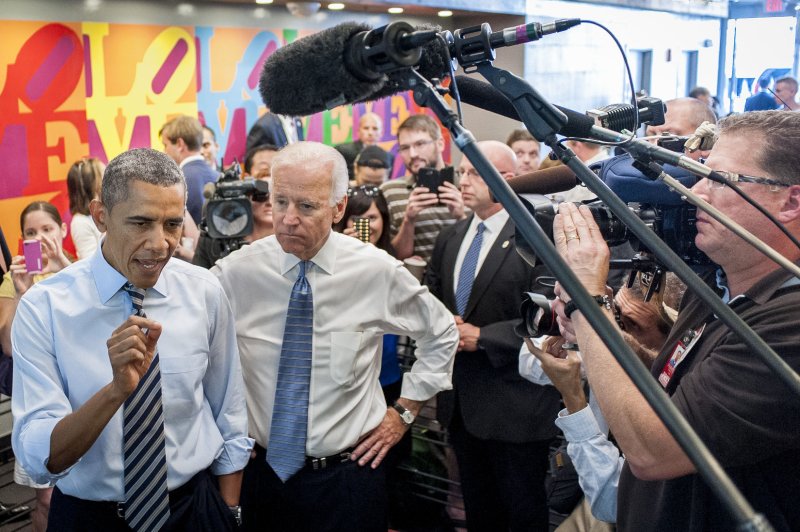President Barack Obama and Vice President Joe Biden order take-out lunch at Taylor Gourmet on Pennsylvania Avenue, in Washington, D.C. on October 4, 2013. The reason he gave was they are starving and the establishment is giving a 10 percent discount to furloughed government workers as an indication of how ordinary Americans are looking out for one another. UPI/Pete Marovich/Pool |
License Photo
WASHINGTON, Oct. 9 (UPI) -- The great American and Oklahoman humorist Will Rogers had a toxic view of the U.S. Congress 80 or so years ago and long before Congress bashing became a contact sport for late night television hosts.
"Every time Congress wanted to pass a law, it became a joke," Rogers quipped. "And every time Congress wished to make a joke, they turned it into a law."
Today, the U.S. government is worse than Rogers' bad joke. Failure to pass a budget is now standard operating procedure. Should the debt-ceiling limit be unreconciled by Oct. 17 and the country defaults, the consequences are almost certainly going to be bad and grow worse the longer government is incapable of action.
Former Speaker of the House of Representatives Newt Gingrich, R-Ga., could boast in last week's Financial Times that American gridlock was a sign of a healthy and functioning democracy reflecting the founder fathers' best intentions and not dysfunctionality or worse.
Gingrich gets a grade of A for imagination and an F for realism. Something is indeed rotten in Washington.
The fundamental and largely unseen issue is whether a political process designed by the best minds of the 18th century can survive the realities of the 21st. Nations rise and fall. The United States isn't a fifth-century Rome or the Soviet Union in the late 1980s.
However, a system of checks and balances and divided government cannot function without compromise. The polarization of both political parties around their extreme wings isn't a prescription for compromise as well as denying the largest bloc of Americans belonging to the stabilizing "middle" of full representation.
Worse, politics is about winning whatever issue or election is in play principally by discrediting the opposition and not about providing good governance. Relentless pursuit of money given the ludicrous nature and full-time demands of campaign financing preclude bringing the best, brightest and most qualified to Washington especially as negative campaigning has proven so effective in demolishing character through whatever means fair or foul.
Hence, experience and wisdom, not mentioned in the U.S. Constitution's four qualifications for president (readers should reread that document for the details), at least in terms of the past three chief executives, are unlikely to be part of the resumes of candidates who next win that office.
Further, with a country that is more or less divided between Red and Blue (i.e. Republicans and Democrats) and an electoral map Gerrymandered to ensure a Republican House and Democratic Senate at least through the 2020 census, help isn't on the way. Nor is the hostility and animosity that persists between both parties likely to dissipate and indeed will almost certainly worsen as ideologically driven sound bites attacking the other side continue to substitute for reason and judgment.
Several pieces of good news brighten this otherwise bleak picture. A combination of the potential breakthrough in disposal of Syrian chemical weapons leading to broader negotiations with Iran and possibly on the Arab-Israeli-Palestinian conflicts cannot be discounted. Even though U.S. President Barack Obama canceled his trip to Asia and assigned Secretary of State John Kerry the heavy lifting, the Trans-Pacific as well as Trans-Atlantic trade and investment partnerships could be game changers.
Unfortunately, the other side of the ledger is grim. Without a healthy economy, for most Americans, standards of living will decline. Expectations about future generations living better than today's will be whimsy. And, barring a miracle, Washington won't tend to the country's business in serious and productive ways.
The United States has faced far worse crises and conditions. In 1776, defeat of the British superpower was far from assured. The Civil War, two world wars and a great depression were likewise existential. But the nation recovered and thrived. Why?
It is glib to say that America was lucky. However, geography, virtually unlimited resources and the prospect of individual success almost beyond comprehension empowered America and Americans.
Today, when threats are far more diaphanous, government is more intrusive and complicated and political gridlock prevents effective action, ironically, the well-being of Americans may never have been at greater risk -- especially when that risk isn't existential but individual and personal.
Were there simple solutions, they would have been taken long ago. And the Churchillian adage of muddling through after exhausting all other options may no longer work.
So, Americans must either accept a darker future or demand that their government does its job. Perhaps an avalanche of email, letters and phone calls will shock Congress and the White House into action.
More likely, without a game changer such as the ones noted above or some very undeserved good luck, jokes and laws will continue to be intertwined and the humor of Will Rogers will be a eulogy to past greatness.
--
(Harlan Ullman is senior adviser at the Atlantic Council in Washington and chairman of the Killowen Group, which advises leaders of business and government.)
--
(United Press International's "Outside View" commentaries are written by outside contributors who specialize in a variety of important issues. The views expressed do not necessarily reflect those of United Press International. In the interests of creating an open forum, original submissions are invited.)















